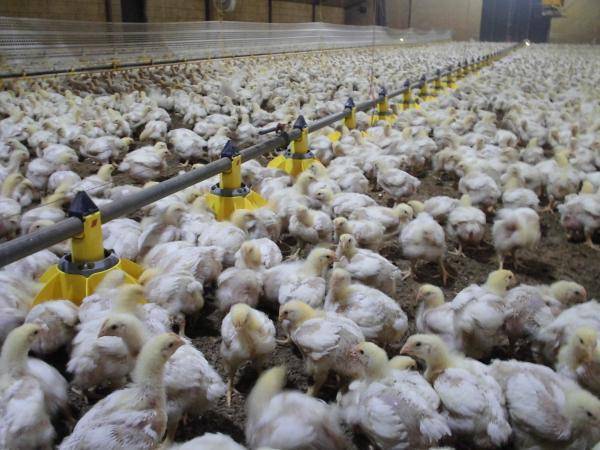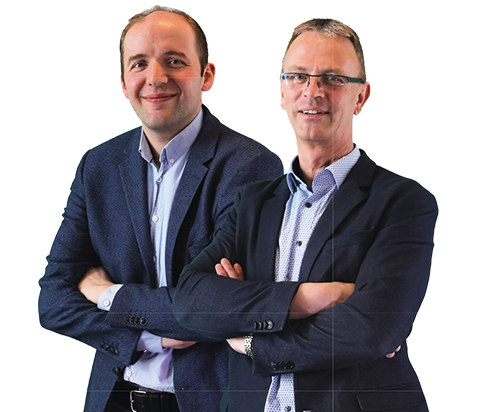Broilers are confronted with an increased coccidial pressure in the 17-25 day age range. An infection of the intestinal wall by Eimeria protozoa leads to an inflammatory response. The latter can lead to an increased bone breakdown. resulting in reduced mobility. The European project Prohealth has investigated the influence of vitamin D3 on broiler mobility during a coccidiosis infection. As a result of the coccidiosis infection, the serum content of 25-OH-vitamin D3 decreases and bone mineralisation is reduced. In these circumstances, the use of Rovimix HyD is the most efficient method to increase serum levels of 25-OH-vitamin D3 and improve bone mineralisation and mobility. This was also confirmed by the numerous practical trials conducted.
Increasing demand for animal products in combination with the increasing world population leads to more intensive animal production. This evolution comes at a price, however: increasing production diseases have an impact on animal health and welbeing, resulting in reduced zootechnical performance, a higher carbon footprint and increased use of antibiotics. 22 partners–including Ghent University–from ten European member states participated in the European project ProHealth (2013-2018). The project aims to improve the health, wellbeing and product quality of pigs, broilers, laying hens and turkeys in an economical and environmentally friendly way. To achieve this, the multifactorial dimension of production diseases was mapped out and this knowledge was used to propose improvement strategies. The project was closed at the end of November 2018 and the results were presented to the general public in Ghent.
In addition to Salmonella in broiler pigs and neonatal mortality in sow husbandry, research was also conducted into the impact of coccidiosis on the bone health of broilers. Coccidiosis is an infectious disease in broilers that is caused by Eimeria protozoa. Eimeria uses broilers as a host to multiply. This reproduction cycle takes approximately 7 days. During the life course of broiler chickens, the coccidial pressure rises to a maximum in the 17-25 day age range. To control coccidiosis, chemical and ionophore coccidiostats or coccidiosis vaccines are used. Despite these preventive measures, broilers continue to be confronted with coccidial pressure.
Coccidiosis and bone health
The presence of Eimeria in the intestines of broilers leads to an infection of the intestinal wall. The immune system responds: an inflammatory response is created in which T cells, B cells and other components are produced. A number of these components have a pro-osteoblast / anti-osteoclast effect,whereby the production of new bone tissue is continued. Other components have a pro-osteoclast / anti-osteoblast effect: in this case bone resorption occurs and the bone degrades. The relationship between this inflammatory response and bone degradation has not yet been confirmed in poultry, but has been demonstrated in other species. Nevertheless, the independent European study examined possibilities to improve the mobility of broilers in case of coccidiosis. one of the tracks is vitamin D. The effect of various levels and sources of vitamin D3 was investigated, whether or not in combination with coccidiosis infection.
Vitamin D
Insufficient levels of vitamin D3 in the feed (1000 IU / kg) lead to reduced mineralisation of the femur and tibia in this study, low serum levels of 25-OH vitamin D3 and the poorest mobility score. A higher dose of vitamin D3 (7000 IU / kg) seems to only partially compensate for this problem. In contrast, replacing vitamin D3 with Rovimix HyD (25-OH-vitamin D3 ensures significantly higher bone mineralisation, higher serum levels of 25-OH-vit D3 and a better mobility score.
What is the impact of a coccidiosis infection on the bone health of broilers? The research shows that the coccidiosis infection results in lower feed uptake, decreased growth, higher feed conversion, reduction in the serum content of 25-OH-vit D3 and reduced bone mineralisation.
The use of Rovimix HyD is more efficient to increase the serum content of 25-OH-vit D3 than the use of a higher dose of the traditional vitamin D3 in the feed. It also leads to better bone mineralisation and better zootechnical performance in both infected and healthy animals. It is important to provide Rovimix HyD for a sufficiently long period: from start to finish.
In the European project, the relevance of scientific research is also tested in practice. To that end, in more than 15 broiler houses, a comparison was made between the classic vitamin D3 and the combination of vitamin D3 + Rovimix HyD. These practical trials confirm the conclusions mentioned above.
1.25-(OH)2-vit D3
In one of the practical trials, the use of 1.25-(OH)2-vit D3 in the form of dried leaves of Solanum glaucophyllum was tested against the traditional vitamin D3. This metabolite of vitamin D3 has a hormonal activity with a direct impact on the Ca / P metabolism. This trial shows that there is no improved mobility and that even more hock burns were detected ....
The use of dried leaves of Solanum glaucophyllum also entails a certain risk: the product is legally only permitted as feed material. An application for registration as an additive was not withheld by EFSA because of the risk for reproduction animals (hormonal product ....). The background to this is the risk of hypercalcemia. In addition, calcium may be extracted from the bones, which naturally leads to more bone problems.
There is no legal maximum for dried leaves of Solanum glaucophyllum despite the fact that 1.25-(OH)2-vit D3 is toxic when the recommended dose is exceeded. For this reason, a correct and homogeneous dosage is of great importance. However, this cannot be controlled analytically, since the analysis of the hormone 1.25- (OH)2-vit D3 in the feed is not possible. This poses a risk not only to the animals, but also to the workers who process the product in the premix or in the feed. The use of this product is, therefore, not without danger. For this reason, DSM decided years ago not to start an EU registration of the 1.25-(OH)2-vitamin D3 component as a feed additive.
Please consult your contact at DSM Nutritional Products NV for more information.
A. Vandeweghe


